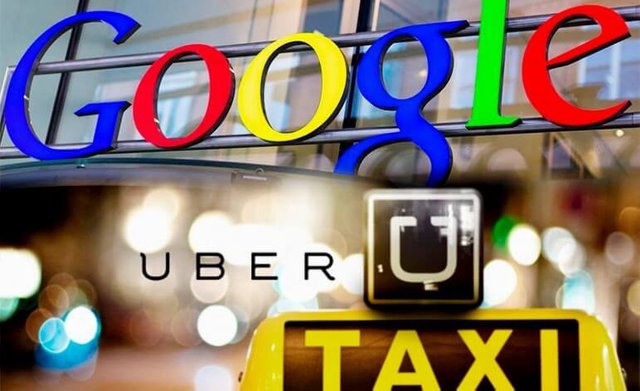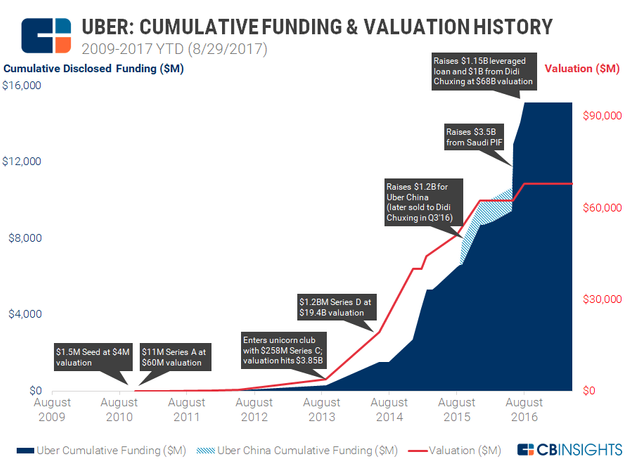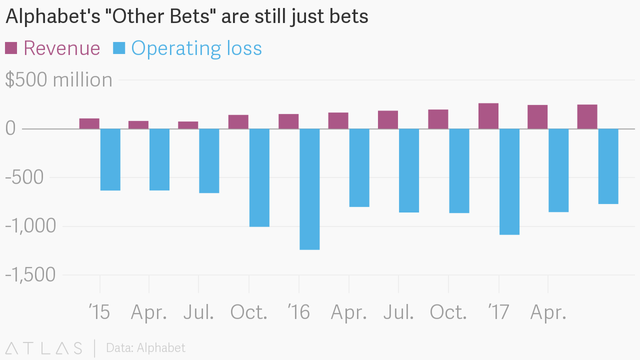 Source: IqbalPost
Source: IqbalPost
Uber’s the most successful pre-IPO startup in history. Google is insanely profitable as the operating system of the internet.
Both these tech giants overcame huge odds to get to today. Yet both may be on the verge of extinction.
NOTE: I have covered these topics extensively. Rather than reiterate old point, below are links to the related articles.
 Source: CB Insights
Source: CB Insights
Google on the other hand is innovating away their business. Their success with voice technology will soon make most search advertising irrelevant. The question is, how to replace the revenue? Unfortunately ads are awful on voice, meaning unless Google plans to innundate users with audio ads, they need to reinvent their business.
An autonomous future
Experts agree, in the not so distant future autonomous vehicles will replace human drivers. As this occurs, car ownership will decline, likely leading to managed fleets.
(For more on possible AI/autonomous scenarios, watch this roundtable on the subject)
This will be a huge shift in human history, freeing up approximately ~52 minutes per day for the average American (just commuting for work). What will we do with all this time? Netflix? News? Facebook? Higher education?
I for one am not hugely optimistic. I believe people pretty much are what they are. For proof, ride a train or bus in Europe. Most are on smartphones, just killing time. The majority check social media, watch cute cat videos or listen to music — nothing productive.
As a culture, our collective attention span is decreasing. Learning, reading, deep work… these things take motivation and focus. And from where I’m sitting, I see autonomous vehicles amplifying our individual tendencies. The motivated and productive will learn, build and produce while the vast majority will merely consume.
While this may be demoralizing from a humanistic sense, it is exciting for entrepreneurs.
Detroit dies, again
Hardware is hard, expensive and has low ROIs relative to other industries. This is why every major auto manufacturer is focused on AI. Companies like Ford Motor Company, General Motors and Mercedes are terrified.
Let me ask you a question. Your last Uber ride, what type of car was it?
Odds are you don’t know, and you don’t care. When individuals don’t own or drive the cars, who cares about the brand. Prestige and horsepower are suddenly irrelevant.
Transportation is becoming commoditized. And commodities are interchangeable, just like toilet paper.
In a world of fleets, the automotive industry changes from heavily B2C to B2B. Suddenly businesses (or cities/governments) own and operate entire fleets, charging individuals for true TaaS (transportation as a service).
That changes things…
The platform play
Rather than selling rides to consumers, the business of the future is that of fleet management. And as the old adage says, it is easier to sell shovels than it is to mine for gold (for more, see this post).
Consider fleets. As more players enter the market, the same issues with Uber’s localized network effects apply. This leads to two possible, logical conclusions: 1) city or state owned autonomous fleets or 2) numerous fleet providers with relatively low margins.
Neither scenario is ideal for entrepreneurs. The operating system however, that is always interesting. Regardless of who wins, the company that allows fleets to autonomously, effectively deploy cars and transport passengers will win.
And unlike hardware, here the network effects are substantial. The data and insights from managing multiple fleets would be invaluable.
Plus there is something even better, we’ll get there soon.
The operating system of autonomous
Let’s assume we go full autonomous. Besides added “free” time, what are the other implications.
Think about flights. We go from here to there, and occasionally even sleep. The airplane is your transportation, food and accomodation, letting individuals sleep their way to new cities.
There is no reason to assume this won’t happen with cars as well. This means the entire interior of the automobile will need to be redesigned. Instead of forward facing chairs, why not a table and chairs, a meeting room, a kitchen, a bed… the options are endless.
As autonomous vehicles become mainstream, our social structures around space will be redefined. And as of today, our lives in transit are up for the taking, hence the Uber vs Google debate.
Likely first steps
As we ride into an autonomous world, there are several easy to predict scenarios/use cases.
Much like laptops and phones provide constant connectivity, voice based control and entertainment at our fingertips, these will soon be standard on all cars.
Whoever provides and controls this will profits. That is the point of thisarticle.
As we spend more and more of our lives traveling in autonomous vehicles, what services will we interact with.
Want to watch Orange is the New Black, Facetime the fam or even troll through Reddit. These are all easy analogies for today. And the OS that controls the cars and connections will control the advertising and make a fortune.
One step further
When your hands are free, new possibilities emerge: from video games or VR experiences to piano lessons, 5 course meals and sex at 60mph… the opportunities are endless.
And the number and magnitude upsells exponentially increases. Nearly every human need could suddenly be serviced on the go (including housing). The implications are enormous, spanning everything from real estate to entertainment, tourism to food services and everything in between.
This is the true “mobile” home.
Internet level disruption
Just as the internet and connectivity transformed the world and industries of old, autonomous vehicles will have similar implications. And while 3% of the US workforce employed as drivers will be replaced, the other changes will be more significant.
The internet made the world a much smaller place, blurring the borders that separate us. Autonomous vehicles will amplify this.
If your car is home, where do you pay taxes? And what about businesses that operate out of vehicles?
When the tangible fabric constraining society is constantly shifting, where does that leave governments.
Finally, Back to Uber and Google
Today there many contenders in the autonomous space. And while few would argue that Google’s in the lead, there is still a long way to go.
Uber has transformed how we think about car ownership. Access and not ownership is winning. I want to get from point A to point B. What is the cheapest, fastest, most convenient way to do it?
So why is this article focused on Google and Uber?
Both businesses are potentially in trouble and also leading candidates to win the autonomous race.
And as we have clearly highlighted, driverless cars will disrupt society, creating massive opportunities, many we have yet to even conceive.
Much like Google owned the internet with the best search engine, OS and platform, the autonomous industry is up for the taking.
Cornered
“…don’t know what to do when their back against the wall, so they just start shootin’” — TI
While Uber is cornered, Google still has options. Thanks to Google’s massive balance sheet and numerous moonshot projects, Alphabet has lots of irons in the fire.
That said, 86.5% of Alphabet’s revenue still comes from their advertising business. Google needs something to land or eventually voice will erode their business.
 Source: Mike Murphy, Quartz
Source: Mike Murphy, Quartz
And Uber is betting everything on autonomous. If someone else scales first, Uber’s business model is bust. The cost basis of paying drivers in a driverless world would kill Uber’s competitive pricing.
In a world of faster, better, cheaper, that is not acceptable. Hence the Uber-Waymo lawsuit (Waymo is Alphabet’s autonomous vehicle division),which will probably cost Uber $2.6B plus the legal fees once all said and done.
And to be honest, is under the table acquisition surprising here? Uber’s track record of breaking the rules has been on public display for most of 2016 and 2017.
Who wins?
For all the reasons outlined here, it is hard to see a scenario where Uber wins. Even if Uber pulls off perfect autonomy and beats Tesla Motors, Lyft, Google, GM and dozens of others to market with autonomous Ubers, it still has inherent challenges — primarily capital expenditures.
For Uber to win here, I believe they need to develop and license the tech and kill their core business. Nothing short of burning the boats would set Uber up to win this battle.
The operating system and not the operator is where the money is at…
Google on the other hand is perfectly positioned to win, assuming they don’t screw up. Google has the best autonomous experts and technology and the most experience. Plus they are fleet agnostic and they own a decent chunk of Lyft.
And let’s not forgot Google’s background building and monetizing operating systems. Android saved Google billions per year in Apple taxes. And Chrome, Google Docs, Gmail and Search serve as the basis for the entirety of most users internet experience.
An OS for autonomous vehicles could be similarly structured, monetizing riders with advertising and services while simultaneously licensing the tech to fleet service providers — double dipping at its best.
Despite their dominance, autonomous is incredibly dangerous for Google. To date, their performance on hardware is horrible. If Alphabet were to try and own the manufacturing, the results could be catastrophic.
And let’s not forget, Google also has a tendency to drop the ball. Google allowed Facebook to become a dominant advertising force and failed to see the threat of Amazon before it was too late. In both instances they played nice when they should have tried to kill the competition. Now Google has major competitors in almost every industry.
What do you think?
Autonomous vehicles will transform society. We didn’t realize the implications of the iPhone until it happened.
What will happen this time?
What are your thoughts? Opinions?
Where do you see the future of transportation going? Got any bold predictions?
Learned something? Click the 👏 to say “thanks!” and help others find this article.
Previously posted on Medium
Hi! I am a robot. I just upvoted you! I found similar content that readers might be interested in:
https://thinkgrowth.org/google-vs-uber-the-battle-for-the-autonomous-os-2c817828425
Downvoting a post can decrease pending rewards and make it less visible. Common reasons:
Submit